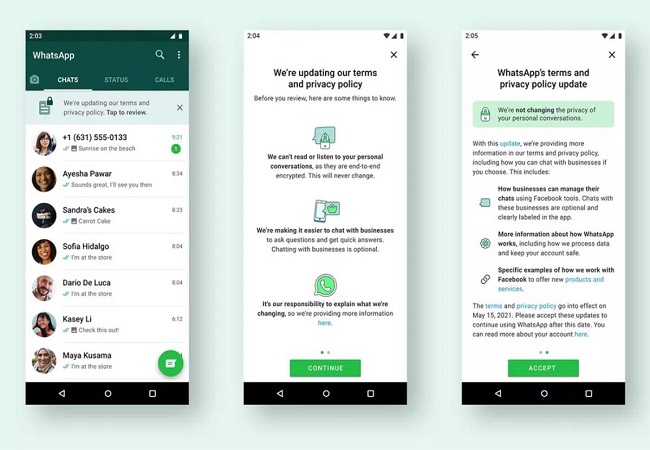New Delhi: Earlier, WhatsApp had announced that they have removed the May 15th deadline for accepting the new privacy policy terms. In fact, the social messaging app made it clear that people will not lose their account after the deadline is over. This announcement came as a brief relief for millions of users around the world. For months people are receiving pop-ups and notifications asking them to accept the new terms. The new terms will allegedly give Facebook a stronger hold on the data of users which can be shared from WhatsApp. These terms have raised concerns among the privacy experts, although they saw this coming sooner or later. This has raised concerns among privacy experts, who knew that this would eventually come. Whatsapp has given more details on their FAQ page.
What happens to your account after May 15 ?
User will be able to use their accounts even if they does not accept the new terms. After delaying the May 15 deadline, WhatsApp says it will keep reminding you to accept the new terms, and eventually you will have to accept them. Those who do not agree to the new policy right now will continue to get the alerts, which as WhatsApp admits, will become persistent after a period of several weeks. That’s not all if one doesn’t accept the new privacy policy, they will face a greater consequence, which WhatsApp revealed recently.
What happens if one doesn’t accept the WhatsApp privacy policy?
Whatsapp announced recently that if a user does not accept the new terms then their account will not remain fully functional.
- You won’t be able to access your WhatsApp chat list.
- You can answer incoming calls, read messaging by tapping the notification alert only.
- And after a few weeks, WhatsApp will stop sending incoming messages and calls to your account.
All this will lead to people deleting their accounts, but thankfully the company will not do it on their own. But, if an account remains inactive for 120 days, WhatsApp accounts are generally deleted. So, in the end, you can either switch over to a different messaging service, or you can accept the new privacy policy if you wish to keep using WhatsApp.
What happens with your information ?
WhatsApp admitted that they collect user information to be able to provide services and customize the experience for each user. Among the information that you share with WhatsApp are your mobile phone number and your profile name to create and use a WhatsApp account. WhatsApp makes it clear that they do not retain your messages and says that messages sent and received by a user are not stored on their servers. The company says, “Once your messages are delivered, they are deleted from our servers.”
However, there are scenarios where the messages may stay on WhatsApp servers temporarily, i.e., if a message remains undelivered for a certain period of time, it is stored in an encrypted form for 30 days, after which it is deleted along with the media forwards that are temporarily stored in encrypted form.
WhatsApp also clarifies that they are collecting your location information at all times. For starters, the customary pleasantries greet you in the Location Information section of the updated privacy policy. They say that you give access to your precise location when you use any location-based services on the app, such as sharing your location with someone on the app.
But what makes it interesting is that they clearly say, “Even if you do not use our location-related features, we use IP addresses and other information like phone number area codes to estimate your general location (e.g., city and country). We also use your location information for diagnostics and troubleshooting purposes.”
About sharing the information, WhatsApp admits that they do share information with other Facebook companies. The updated terms say, “We may use the information we receive from them, and they may use the information we share with them, to help operate, provide, improve, understand, customize, support, and market our Services and their offerings, including the Facebook Company Products.”
Some of the listed utilities for this data sharing are believed to help in improving infrastructure and delivery systems, understanding how a user uses the platforms differently and also promote data safety and security across the board. This also means that the data will be used to serve personalized suggestions as well as advertisements targeted at a user and their usage trends across a variety of platforms. For this the updated terms say that it is for “improving their services and your experiences using them, such as making suggestions for you (for example, of friends or group connections, or of interesting content), personalizing features and content, helping you complete purchases and transactions, and showing relevant offers and ads across the Facebook Company Products.”
WhatsApp also says that the “continued use of our Services confirms your acceptance of our Terms, as amended”. To be honest, the updated privacy policy and terms of service does not contain any new and shocking revelations. It is just provides a much greater clarity as to how tech companies like WhatsApp, Facebook and the other third party services access, manage and use your data.

